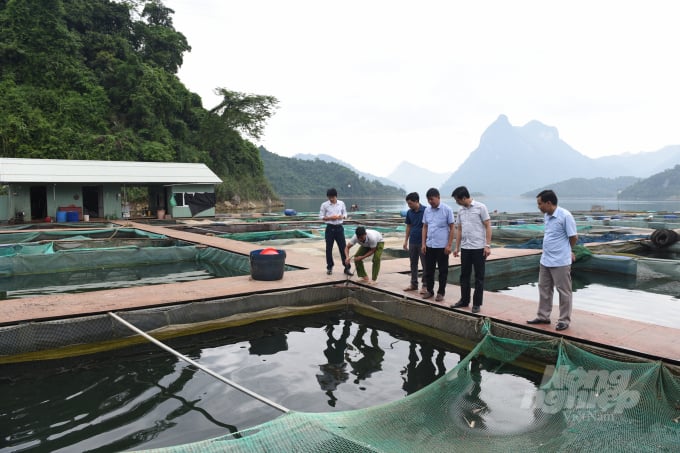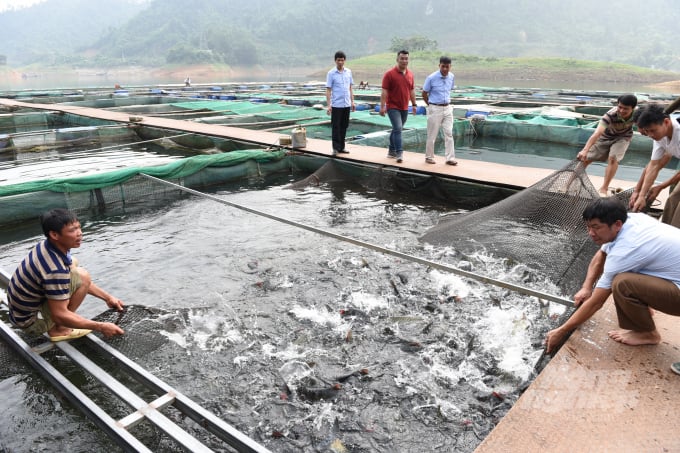June 20, 2025 | 02:23 GMT +7
June 20, 2025 | 02:23 GMT +7
Hotline: 0913.378.918
June 20, 2025 | 02:23 GMT +7
Hotline: 0913.378.918

The reservoir at Tuyen Quang Hydropower Plant has good conditions for farmers to develop clean fisheries. Photo: Dao Thanh.
With over 8,000 hectares of ecological water surface, clean natural water resources, abundant aquatic species, the reservoir at Tuyen Quang Hydropower Plant has good conditions for farmers to develop clean fisheries.
Up to now, more than 100 aquaculture households are focusing on raising speciality fish with high economic value, expecting to get an output of over 550 tons/year. Caged-fish farming develops strongly in the communes of Son Phu, Yen Hoa, Da Vi, and Na Hang town.
Vi Ngoc Quy, Head of Agriculture Department of Na Hang district, said that most of the caged-fish farming models at Tuyen Quang hydropower reservoir are developed in the direction of clean aquatic products. Now, the district has had 4 fish products certified as three-star and four-star products under the One Commune-One Product (OCOP) programme.
To promote the clean aquaculture industry, the district’s Agriculture Department continues to advise the District People's Committee to develop and issue a plan on fisheries development for the period of 2021 – 2025.
The department also consults farms to produce following the changes of weather, the market and adaptation to climate change, calling farms to apply high technology in aquaculture production, intensive caged-fish farming, develop green tourism associated with environmental protection and water resource protection.
Truong Tuan Minh, who owns a large-scale caged-fish farm at the catch of Na Hang hydropower reservoir, said that they had advantages to develop aquaculture production there.
“Natural water is quite clean. The source of trash fish on the lake is still quite abundant. So the farming households rarely use industrial feed,” he said.
Currently, his family has 30 cages of fish. His family's aquaculture facility has been granted a VietGAP certificate. On average, he supplies 120 to 150 tons of fish to market yearly, creating regular jobs for four workers, each receiving a monthly salary of VND 4.5 million.
Tuan aid that with natural food, fish grew up slower but the fish was more delicious, which attract traders, especially, restaurants and hotels who cared much about the taste of the fish.
Vi Anh Duc, Director of Nhat Nam Fish Farming Cooperative – the largest fish farming facility in the Tuyen Quang hydropower reservoir said that before 2019, when he had not been certified for a clean fish brand, he mostly sold the fish to small traders in the province.

More than 100 aquaculture households are focusing on raising speciality fish with high economic value, expecting to get an output of over 550 tons/year Photo: Dao Thanh.
Over the past year, the cooperative's fish has been raised according to clean and environmentally friendly standards, plus improved branding development, many restaurants and clean food stores across Vietnam eyed the cooperative’s products.
In July this year, Tuyen Quang Province People's Council issued a resolution on policies to support the development of agricultural production, forestry, aquatic products; OCOP products and new rural construction in the province in the period of 2021 - 2025.
Under the resolution, to the fisheries sector, organisations and individuals are supported in breeding, input materials and finance to develop in the direction of commodity production.
The province has developed aquaculture planning including the planning of ponds and small lakes for aquaculture, the planning for aquaculture development at hydropower plant’s reservoir and the planning for caged-fish farming on rivers.
Tuyen Quang province implemented the planning of centralised caged-fish farming in the districts of Na Hang, Lam Binh, Chiem Hoa, Ham Yen, Yen Son, Son Duong, Tuyen Quang city, reaching 1,460 cages by 2020 with an output of 871 tons.
By 2035, the province expects 1,910 cages with an output of 1,654 tons, mainly raising speciality species with high economic values. The province also implemented the planning of a concentrated tilapia farming area with a farming area of 158ha, a volume of 2,000m3 and an output of 751 tons by 2020.
The tilapia farming area is expected to increase by 200ha with an output of 1,183 tons by 2025.
By 2035, the province expects the total aquaculture area will reach 14,000 hectares. Of that, the area of ponds and small lakes for aquaculture is 2,000 ha; the area of the irrigation lake used for fish farming is 800 ha; the area of the hydroelectric reservoir used for fish farming is 11,200 ha; a total number of fish cages are 2,500 cages; aquaculture production will reach from 11,000 tons to 12,000 tons.
Translated by Hien Anh
![Turning wind and rain into action: [9] Digitizing hydrometeorological data in response to climate change](https://t.ex-cdn.com/nongnghiepmoitruong.vn/608w/files/news/2025/06/17/z6704423696987_15fd32ffc26d590d204d520c9dac6786-nongnghiep-165943.jpg)
(VAN) Farmers have begun accessing hydrometeorological applications to adjust their cropping schedules, aiming to ensure productivity and adapt to climate change.
![Turning wind and rain into action: [8] Real-time salinity detection and early warning technology](https://t.ex-cdn.com/nongnghiepmoitruong.vn/608w/files/news/2025/06/17/z6704423696987_15fd32ffc26d590d204d520c9dac6786-nongnghiep-151127.jpg)
(VAN) Thanks to the integration of modern hydrological-hydraulic models, remote sensing technologies, and artificial intelligence, the accuracy of hydrological forecasting has significantly improved.
![Turning wind and rain into action: [7] Early disaster warnings help marine farmers minimize losses](https://t.ex-cdn.com/nongnghiepmoitruong.vn/608w/files/news/2025/06/17/z6704423696987_15fd32ffc26d590d204d520c9dac6786-nongnghiep-142942.jpg)
(VAN) In recent years, thanks to early disaster warnings and forecasting, marine farmers in Khanh Hoa province have been able to reduce risks and losses, thereby improving production efficiency.
![Turning wind and rain into action: [6] ‘Four on-the-spot’ disaster management software](https://t.ex-cdn.com/nongnghiepmoitruong.vn/608w/files/news/2025/06/17/e5a48259d6a262fc3bb3-nongnghiep-183800.jpg)
(VAN) By simply activating the scenario on the disaster management software, the relevant authorities immediately know how many households need to be evacuated, where to evacuate them to, and by what means of transportation…
![Turning wind and rain into action: [5] Hue applies modern technology in disaster forecasting](https://t.ex-cdn.com/nongnghiepmoitruong.vn/608w/files/news/2025/06/17/z6704423696987_15fd32ffc26d590d204d520c9dac6786-nongnghiep-093938.jpg)
(VAN) In Hue city, modern technology has recently been applied in meteorological and hydrological forecasting and warning, helping to reduce the damage caused by natural disasters.

(VAN) A cutting-edge farming technique being implemented on an experimental ranch in Arizona's Sonoran Desert has already saved a billion gallons of water over five years, according to Civil Eats.

(VAN) Poultry and pig production and the environment can be boosted through enhanced water technology, according to new research.